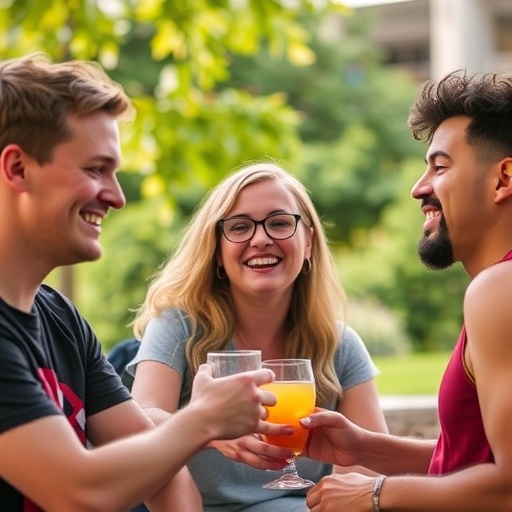In contemporary discourse on mental health and social well-being, the fundamental role of friendship remains ever pertinent. Especially within the queer community, friendships provide not only emotional fulfillment but also crucial support systems that transcend traditional family boundaries. Recent research conducted by Michigan State University in collaboration with the University of Kentucky delves deeply into the unique dynamics of queer friendships, revealing complexities that challenge conventional understandings of social support and interpersonal connection. This interdisciplinary study offers new insights into how sexual identity homophily—the degree to which friends share similar sexual identities—impacts the psychological well-being of queer individuals in nuanced and sometimes paradoxical ways.
Friendship, defined as a voluntary, affective bond between individuals, is a critical determinant of psychological resilience and life satisfaction across populations. For sexual minorities, especially those identifying as queer, these bonds often bear additional significance. This community’s historic marginalization, coupled with varying levels of family acceptance, propels queer friendships to function as surrogate families, providing validation, acceptance, and an indispensable sense of belonging. Researchers employed data from the extensive American Friendship Project, a nationally representative, multi-year initiative examining friendship networks across the United States, to explore these phenomena within queer populations.
The study’s core findings articulate a complex narrative. Individuals with at least one friend whose sexual identity matches their own—for example, two bisexual individuals—were found to report higher overall life satisfaction and reduced feelings of loneliness. This result corroborates theories signaling the positive psychosocial effects of homophily, wherein shared experiences and identities foster empathy and mutual understanding. However, when examining friendships between queer individuals of varied sexual identities—such as a bisexual woman and a gay man—participants reported similarly elevated life satisfaction rates but paradoxically experienced increased loneliness. This duality highlights how identity similarity is not a monolithic predictor of social well-being.
Several theoretical frameworks can elucidate these findings. Geographic dispersion serves as one explanatory vector; the research notes that over half of U.S. adults live far from their close friends, limiting opportunities for in-person social engagement. For queer individuals, whose friendships often provide essential psychosocial resources, physical distance may underscore a sense of social fragmentation, intensifying loneliness despite emotional closeness maintained through digital or intermittent interactions. Additionally, shared marginalized identities may heighten a collective consciousness of exclusion from the broader heteronormative society, revealing a double-edged sword where validation within the queer community simultaneously amplifies awareness of societal alienation.
Brooke Wolfe, a postdoctoral scholar and burgeoning authority on communication within marginalized populations, emphasizes the need to parse these paradoxes. Wolfe posits that friendships within queer circles, while broadly beneficial, also call attention to lived experiences of systemic discrimination and social exclusion pervasive even under legal frameworks that criminalize sexual identity-based discrimination. These social realities mean that the protective benefits of queer friendships occur within a broader context of political and cultural marginalization, which can shape emotional outcomes in complex ways.
These findings carry significant implications for mental health professionals, sociologists, and community organizers. Understanding the dual effects of similarity in queer friendships can inform targeted interventions that not only facilitate connection but also address the emotional costs associated with marginalization and distance. Digital platforms and community programs could be calibrated to mitigate the sense of isolation linked with geographic dispersion, fostering both emotional intimacy and opportunities for embodied social interactions.
Moreover, the study reaffirms the indispensable role of queer friendships in cultivating a sense of belonging that counters dominant narratives which often render queer identities invisible or deviant. The creation of chosen families and networks grounded in mutual recognition of identity and experience uniquely positions queer friendships as sites for resilience and affirmation. This role is intensified in sociopolitical climates where acceptance fluctuates widely and laws, though protective, do not fully safeguard social inclusion.
The research contributes to a growing body of social science scholarship interrogating the intersectionality of identity, geography, and mental health. It draws on demographic analytics and psychosocial evaluation metrics to sketch a detailed portrait of the queer friendship landscape. Through quantitative data linked to self-reported measures of loneliness and life satisfaction, it bridges gaps between abstract theoretical constructs and lived realities, offering a model for future empirical inquiry.
The nuanced understanding generated here challenges simplistic assumptions that ‘more similarity equals better outcomes.’ Instead, it urges a more sophisticated analysis of how shared identities operate within layered social contexts—how validation derived from mutual understanding coexists with heightened recognition of exclusion. For queer individuals navigating a complex social environment, friendships are simultaneously safe havens and reminders of otherness, shaping emotional terrain in multifaceted ways.
Future research avenues emerging from these findings might include longitudinal tracking of friendship networks to observe changes over time, deeper qualitative investigations into the subjective experiences of queer friendships, and expansive cross-cultural comparisons to situate these dynamics within global contexts. Additionally, exploring the role of non-romantic friendships vis-à-vis romantic partnerships could illuminate varied sources of social support and their differential impact on well-being.
In sum, this collaborative research from Michigan State University and the University of Kentucky underscores the vital yet complicated role of queer friendships in shaping psychological health. As communities and societies at large continue to grapple with diversity and inclusion, such empirical insights present critical opportunities to foster environments where queer individuals not only survive but thrive across all spheres of life.
Subject of Research: Friendship dynamics and their effects on well-being among queer individuals
Article Title: What Difference Does a Queer Friend Make? Exploring Familial-Related Benefits Across Friendship Types
News Publication Date: 11-Jun-2025
Web References:
- https://www.tandfonline.com/doi/full/10.1080/27703371.2025.2510654
- https://journals.plos.org/plosone/article?id=10.1371/journal.pone.0305834
References:
Wolfe, B., et al. (2025). What Difference Does a Queer Friend Make? Exploring Familial-Related Benefits Across Friendship Types. LGBTQ+ Family An Interdisciplinary Journal. DOI: 10.1080/27703371.2025.2510654
Keywords: Social sciences, Demography, Population, Social research, Communications




